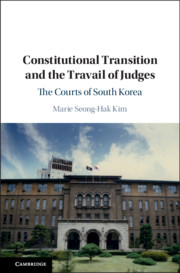Book contents
- Constitutional Transition and the Travail of Judges
- Constitutional Transition and the Travail of Judges
- Copyright page
- Dedication
- Contents
- Figures
- Tables
- Preface
- 1 Introduction
- 2 The Making of the Constitution and the Courts, 1945–1962
- 3 Jurisprudential Evolution, 1962–1972
- 4 The Yusin Era, 1972–1980 (1): The Laws
- 5 The Yusin Era, 1972–1980 (2): The Courts
- 6 The Yusin Era, 1972–1980 (3): The Judges
- 7 Political Transitions and Rule of Law, 1980–1987
- 8 Democracy and Travails of Judges, 1987 to the Present
- 9 Conclusion
- Bibliography
- Index
8 - Democracy and Travails of Judges, 1987 to the Present
Published online by Cambridge University Press: 23 July 2019
- Constitutional Transition and the Travail of Judges
- Constitutional Transition and the Travail of Judges
- Copyright page
- Dedication
- Contents
- Figures
- Tables
- Preface
- 1 Introduction
- 2 The Making of the Constitution and the Courts, 1945–1962
- 3 Jurisprudential Evolution, 1962–1972
- 4 The Yusin Era, 1972–1980 (1): The Laws
- 5 The Yusin Era, 1972–1980 (2): The Courts
- 6 The Yusin Era, 1972–1980 (3): The Judges
- 7 Political Transitions and Rule of Law, 1980–1987
- 8 Democracy and Travails of Judges, 1987 to the Present
- 9 Conclusion
- Bibliography
- Index
Summary
The promulgation of the Constitution in 1987 has been hailed as a defining moment in Korean history, putting to an end the long authoritarian rule and the moribund streak of constitutional justice. Constitutional adjudication became the primary means through which to enforce fundamental norms. There was a massive call from civil society for transitional justice, and a number of cases decided during the authoritarian period have come to retrial. The most notable turnabout in jurisprudence concerned cases involving the emergency decrees from the Yusin period. In 2010 and 2013, the Supreme Court and the Constitutional Court each declared that the emergency decrees were unconstitutional. This has given rise to the question of an unconstitutional constitution. Recent jurisprudence reflects the global trend of the constitutionalization of law, in which the constitution becomes a legal instrument applicable in all aspects of law and judicial administration.
Keywords
- Type
- Chapter
- Information
- Constitutional Transition and the Travail of JudgesThe Courts of South Korea, pp. 285 - 318Publisher: Cambridge University PressPrint publication year: 2019

